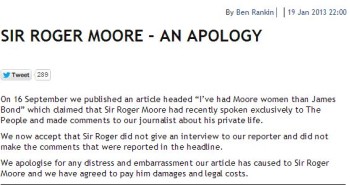
(Credit: People, screenshot)
Newspaper The Sunday People apologized and announced it’s paying Roger Moore “damages and legal costs” after its touted September interview with Moore turned out to be a hoax, the Press Gazette reported.
The fake interview focused on Moore, who played James Bond in several feature films, his sex life and fame. Quotes attributed to Moore included “I’ve had more women than James Bond.” Moore is also quoted as saying:
“Being a famous film star does funny things to people. People are always very nice but they behave differently around you.
“I was too good looking to be a baddie. I had to be a hero because I looked like one. But I’m actually a coward and nothing like Bond.”
The People’s apology didn’t offer too much information about how the hoax happened, but did own up to the error. It read:
“On 16 September we published an article headed ‘I’ve had Moore women than James Bond’ which claimed that Sir Roger Moore had recently spoken exclusively to The People and made comments to our journalist about his private life.
“We now accept that Sir Roger did not give an interview to our reporter and did not make the comments that were reported in the headline.
“We apologise for any distress and embarrassment our article has caused to Sir Roger Moore and we have agreed to pay him damages and legal costs.”
According to the New Statesman, the Daily Mail also got roped into the phony interview when it “directly re-printed quotes from the now-removed People piece” without giving credit to The People. Even though it later reportedly unpublished the article, news outlets including the Otago Daily Times and Indian Express picked the fake quotes up and then credited them to the Daily Mail. iMediaEthics wrote to the Daily Mail asking for confirmation it re-published without credit the quotations, if it will be publishing a correction or apology and if it has heard from Moore’s representatives over the stolen, and fictitious, quotes.
Hilary Kingsley, a legal adviser for Mail publisher Associated Newspapers Limited, told iMediaEthics by email:
“We are currently in negotiations with lawyers representing Roger Moore and therefore we cannot comment at the moment.”
This isn’t the first time a UK newspaper’s tales about Moore and his wife have led to a financial settlement. In 2011, iMediaEthics wrote about the Daily Mail paying Moore’s wife “substantial damages” over a 2010 article alleging she had an affair in the 1950s.
iMediaEthics asked the UK Press Complaints Commission if it received any complaints over this case. The PCC’s Catherine Speller told iMediaEthics by email:
“The PCC did not receive any complaints about the article. The People’s apology and payment of damages to Sir Roger Moore was a result of legal action.”
iMediaEthics has writen to The People asking:
- How the hoax happened — did someone pose as Moore?
- If the interview was conducted over email or phone
- If Moore sued The People over the interview and if so, what the settlement was
- If this incident will prompt any new practices at The People
Earlier this month, iMediaEthics wrote about controversy surrounding the naming of the Delhi, India rape victim known as Braveheart. The People interviewed the victim’s father in the weeks after her death from her injuries. But, after The People‘s article named the victim — and other news outlets followed suit — the father denied he gave The People the OK to name his daughter yet. Under Indian law, rape victims can’t be named without permission.






Comments Terms and Conditions